Seminars
VALIDATE is an international network of vaccine researchers focused on four pathogens causing diseases with significant impact on low and middle-income countries: tuberculosis, leishmaniasis, melioidosis and leprosy. Our seminars highlight some of the important research being undertaken by our extensive community of researchers. We will put details of any upcoming seminars on this page.
VALIDATE Vaccines for Skin NTDs Seminars 2025 & 2026 - Watch Now
Took place 21 January 2026
About the Talks
The Social Challenges of Clinical Research in Skin NTDs in Remote Rural Areas
Mrs Alexandra Cossio Duque, CIDEIM, Colombia
Clinical research in remote rural settings faces unique and persistent barriers — from limited infrastructure and workforce shortages to social dynamics that influence participation, follow-up, and trust. In this talk, Mrs Cossio outlines the real-world challenges encountered when conducting research on skin NTDs in underserved areas and proposes context-sensitive strategies that help ensure studies are ethical, feasible, and meaningful for the communities involved.
Integrating the Vaccine Sciences Within Social, Economic and Policy Perspectives
Prof Maria Elena Bottazzi, Baylor College of Medicine, USA / Honduras
Vaccine development is shaped by an interconnected system of scientific, social, economic, and policy forces. Prof Bottazzi will explore why incorporating these broader perspectives early in the research and development pathway is essential to ensuring successful translation — particularly for NTD vaccines intended for low- and middle-income countries. She will highlight challenges and opportunities for accelerating equitable access to vaccines for the world’s most underserved populations.
About the Speakers
Mrs Alexandra Cossio Duque
CIDEIM, Colombia
Alexandra Cossio, RN, MSc in Epidemiology, and PG Certificate in Clinical Trials, is a TDR/WHO Clinical Research Fellow at Novartis Switzerland and Co-Lead for Clinical and Community Research at CIDEIM. With more than 15 years of research experience focused on NTDs, she works to improve diagnosis and treatment access for vulnerable populations. She is a strong advocate for community-centred research and equitable healthcare across underserved regions.
Prof Maria Elena Bottazzi
Baylor College of Medicine, USA
An internationally recognised vaccinologist and global health leader, Prof Bottazzi co-created the patent-free COVID-19 vaccine technologies behind Corbevax and Indovac. She leads major partnerships to advance vaccines for diseases that disproportionately affect the poorest communities and has played a key role in shaping global health policy and science communication. In 2022, she was jointly nominated for the Nobel Peace Prize for her contributions to vaccine equity.

About the talks
Patient Involvement in Leishmaniasis Product Development: The Role of Qualitative and Mixed Methods
Dr Maria del Mar Castro Noriega, CIDEIM, Colombia
Dr Castro will explore how qualitative and mixed-methods research can inform early-stage product development and implementation strategies for cutaneous leishmaniasis. She will discuss approaches for identifying patient preferences, defining research priorities, and understanding how communities experience disease — insights that can guide the design of diagnostics and treatments that are acceptable, usable, and impactful in real-world settings.
Bridging the Gap: From Intervention to Impact Through Implementation Research and Social Innovation
Mrs Maria Isabel Echavarría, CIDEIM, Colombia
Implementation research and social innovation provide essential tools for ensuring that new interventions — such as diagnostics, therapeutics, or vaccines — translate into improved outcomes in practice. In this talk, Mrs Echavarría will highlight participatory, intersectoral, and context-driven strategies that help overcome systemic barriers, strengthen health systems, and empower communities to co-create sustainable solutions for NTD control.
About the Speakers
Dr Maria del Mar Castro Noriega
CIDEIM, Colombia
An MD with an MSc in Epidemiology, Dr Castro has over 12 years of experience in clinical and implementation research on cutaneous leishmaniasis. Her work focuses on understanding disease determinants, evaluating the value of novel diagnostic and therapeutic products, and integrating patient preferences into product development and deployment. She has led studies in resource-limited settings and contributed to early-phase NTD product development as a WHO/TDR fellow.
Mrs Maria Isabel Echavarría
CIDEIM, Colombia
A microbiologist with an MPH in Global Health from the University of Washington, María Isabel Echavarría has extensive experience supporting health programmes in Colombia and promoting community-based research approaches. She coordinates regional implementation research capacity-building and leads the SIHI LAC Hub, fostering social innovation initiatives that support locally driven solutions for neglected tropical diseases across Latin America.
About the Seminar
In this first seminar of the series, we focus on the pathogenesis of skin neglected tropical diseases (NTDs), featuring expert insights into two major challenges: cutaneous leishmaniasis and Buruli ulcer. We will host two seminars on the topic of Skin NTD Pathogenesis — this is the first.
Immunopathogenesis in Cutaneous Leishmaniasis
Dr Fernanda Oliveira Novais, The Ohio State University, USA
Cutaneous leishmaniasis presents with a wide range of clinical outcomes, with immune responses often driving much of the pathology. Dr Novais will discuss her lab’s investigations into the immune mechanisms that promote tissue damage without contributing to parasite control — and how this knowledge could help identify novel immunotherapeutic strategies.
Inhibition of Sec61 by Mycolactone – A Virulence Mechanism with Major Impacts on Cellular Physiology Spanning Immunology, Cytotoxicity and Cardiovascular Function
Prof Rachel Simmonds, University of Surrey, UK
It has been more than a decade since mycolactone was first shown to inhibit protein translocation into the endoplasmic reticulum via the Sec61 translocon. Since then, significant advances have been made in understanding how this single interaction triggers a cascade of effects, ultimately leading to the necrotic skin ulcers characteristic of Buruli ulcer. In this talk, Prof Simmonds will explore the broader implications of these findings for our understanding of Mycobacterium ulcerans biology and argue that prevention — through vaccination — is preferable to current treatment options.
About the Speakers
Dr Fernanda Oliveira Novais, The Ohio State University, USA
Dr Novais is Assistant Professor at Ohio State University and Co-Director of the Host Defense and Microbial Biology Program at the Infectious Diseases Institute. With over 20 years of experience in immunology, her research combines murine models and human studies to investigate immune pathways linked to severe disease and treatment failure in cutaneous leishmaniasis.
Prof Rachel Simmonds, University of Surrey, UK
Research in Rachel's group focusses on the mechanism of action of mycolactone, the lipid-like immunosuppressive toxin of Buruli ulcer. Mycolactone has many unusual and fascinating biological activities, and in 2014 we identified its mechanism of action – as an inhibitor of Sec61-dependent protein translocation. We are now applying this knowledge to understand more about Buruli ulcer and basic cell biology. This finding also revealed an important role for haemostasis in Buruli ulcer, and we are currently seeking to understand how this may be linked to susceptibility to infection. Together, my research underpins the prevention, transmission, diagnosis, and treatment of Buruli ulcer, a neglected tropical disease.
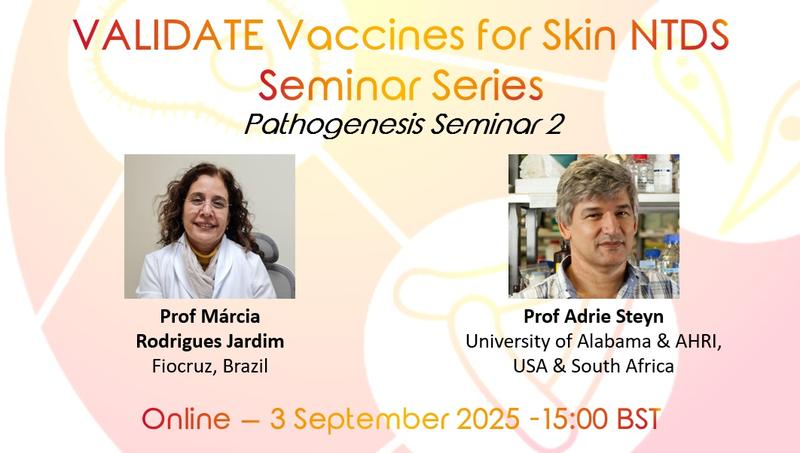
Watch now on the VALIDATE Hub (find out how to log in here)
About the Seminar
In the second seminar of the Skin NTD Seminar series, we focus on the pathogenesis of skin neglected tropical diseases (NTDs), featuring expert insights into two major challenges: Tuberculosis and Leprosy. This is the second and final seminars on the topic of Skin NTD Pathogenesis. However, the Skin NTD Seminars will continue in to late 2025 and 2026
Unmasking Human Tuberculosis: Insights into Granuloma Biology and Disease Pathogenesis, Prof Adrie Steyn, AHRI & University of Alabama, South Africa & USA
Despite decades of research, Mycobacterium tuberculosis (M.tb) remains a formidable pathogen. Central to its persistence and pathogenesis is the spectrum of TB lesions, which is yet undefined. In this talk, Adrie will present insights derived from the systematic study of human TB lesions obtained from surgically resected and postmortem lung tissue. Leveraging spatial transcriptomics, high-resolution mass spectrometry, and multiplexed imaging, he will describe the cellular architecture and molecular gradients that shape TB lesion fate. Ultimately, these insights may accelerate the development of diagnostics, therapies, and vaccines that are more attuned to the true biology of TB in humans.
Leprosy: History, Pathogenesis, and Treatment, Dr Márcia Rodrigues Jardim, Fiocruz, Brazil
Leprosy primarily affects the skin and peripheral nerves, with leprosy neuropathy being its most serious and potentially disabling manifestation. Dr Jardim will provide an overview of the disease, highlight recent scientific advances in its pathogenesis, and explore the crucial role of early diagnosis and treatment.
About the Speakers
Prof Adrie JC Steyn PhD, AHRI & University of Alabama, South Africa & USA
Adrie was appointed at AHRI in Durban, South Africa, and the University of Alabama at Birmingham in Birmingham AL, USA. He is interested in the bioenergetics of Mtb, mode of action of anti-TB drugs targeting the Mtb electron transport chain, and the immunometabolism of Mtb infected host cells. He also studies the spectrum of active TB lesions using a range of next-generation technologies i.e., spatial transcriptomics, multiplex immunofluorescence, metallomics, high-resolution proteomics, 3D structures of granulomas and leads efforts to identify latent TB infected lesions in the lungs of decedents who died of causes other than TB.
Prof Márcia Rodrigues Jardim, Oswaldo Cruz Institute (Fiocruz), Brazil
Prof Jardim is Professor of Neurology and a clinician at the Leprosy Laboratory of the Oswaldo Cruz Institute. Her research focuses on the neurological impacts of leprosy, especially leprosy neuropathy, and improving strategies for early diagnosis and intervention.

Took Place 29 October 2025
About the Seminar
In the third seminar in the series, we explored advances in leprosy research, Buruli ulcer vaccine models, and spatial and single-cell transcriptomics for vaccine design.
Basic and Translational Research for Leprosy: A Long Road Leading to Prevention, Early Diagnosis, and Novel Therapeutics
Prof Manabu Ato, National Institute of Infectious Diseases, Japan
More than 150 years after the discovery of Mycobacterium leprae, research progress remains unsatisfactory. This is largely due to the lack of a reliable in vitro culture method and an appropriate animal model for leprosy. In this talk, Manabu will present his team’s basic and translational research efforts aimed at overcoming these challenges and advancing leprosy control.
Buruli Ulcer Vaccine Animal Models: Past, Present and Future Challenges
Dr Stephen Muhi, University of Melbourne, Australia
Since the first murine Buruli ulcer vaccine model was established in 1957, significant progress has been made in understanding the pathogenesis and transmission of Mycobacterium ulcerans in Australia. Nevertheless, these advances have not translated into meaningful public health interventions—cases in Australia continue to rise and are now emerging in densely populated metropolitan regions. Steve will talk about the compelling need for a Buruli ulcer vaccine and how animal models are pivotal in the development pathway. The presentation will examine the historical landscape of Buruli ulcer vaccine modelling, highlight the challenges in translating pre-clinical results into real-world application, and discuss current research and upcoming plans to establish innovative models to test vaccines in the most relevant hosts: native Australian possums and humans.
Spatial & Single Cell Transcriptomics: Decoding Skin Resident Immunity from Melanoma to Mycobacteria
Dr Andrés Vallejo Pulido, University of Southampton, UK
In this talk, Andres will walk through the practical toolkit—and the analytical mindset—behind today’s spatial and single-cell transcriptomics platforms. He will present side-by-side case studies in cutaneous melanoma and Mycobacterium tuberculosis infection, showing how high-resolution tissue maps reveal immune cell positioning, pathogen footprints, and therapeutic weak spots. Andres will introduce a new barcoding strategy for tracking intracellular bacteria at single-cell scale, discuss common pitfalls such as tissue preparation and data integration, and outline how these readouts feed directly into vaccine antigen selection and delivery system design.
About the Seminar
In this fourth seminar in the series, we highlighted recent advances in Buruli ulcer vaccine development and explored how spatial and single-cell transcriptomics were transforming vaccine design.
A Composite Subunit Vaccine Confers Full Protection Against Buruli Ulcer Disease in the Mouse Footpad Model of Mycobacterium ulcerans Infection
Prof Rajko Reljic, St George’s, University of London, UK
Rajko presented results from a recent study in which his team demonstrated that an experimental subunit vaccine combining mycolactone and protein antigens could provide complete protection against M. ulcerans infection in the mouse model. These findings marked an important step towards developing an effective vaccine against Buruli ulcer.
Dr Camila I. de Oliveira, Fundação Oswaldo Cruz, Brazil
Attenuated parasites as a road for vaccine development against CL – roadblocks and advancements
In Brazil, cutaneous leishmaniasis (CL) is caused mainly by one species but is associated with a spectrum of clinical manifestations. In this talk, Camila shared results regarding the use of attenuated cell lines for vaccine development against CL caused by L. braziliensis. She also discussed alternative scenarios and other advances underway to meet the challenges of vaccine testing and development.
VALIDATE 2025 Seminars - Watch Now
About the Seminar
In this talk, Dr Violet Warwick and Dr Emmanuel Olawale Olamijuwon introduce CAID, a no-code, user-friendly web application tailored to the discovery of immune correlates of protection. The CAID app allows users to leverage machine-learning for feature selection to identify key immune attributes relevant to an outcome of interest. This approach succeeds even with a great many attributes, which could be both immune and sociodemographic factors.
These features can then be taken forward into classical regression models, including mixed models, to evaluate their statistical significance.
Patterns in the data can be visualised using correlograms, boxplots, scatter plots etc. Related datasets can be appended together, missingness identified and subsets defined.
As it is designed to run on the least computationally intensive devices, it may be particularly useful for researchers in low and middle income countries. However, it should help researchers everywhere accelerate the vaccine development pipeline.
About the Speakers
Dr Violet Warwick is a Research Fellow at the University of St Andrews with a background in biochemistry and a PhD in drug design. She has extensive experience as a clinical trialist and has since gained additional qualifications in computing, enabling her to apply data science techniques to medical challenges. Her current research focuses on using machine learning to identify immune correlates of protection (CoP), which can serve as predictors of vaccine efficacy and inform decision-making in clinical development, licensing, and deployment.
Dr Emmanuel Olawale Olamijuwon is a Lecturer in the School of Geography and Sustainable Development at the University of St Andrews. He has over five years’ experience analysing clinical, survey, and digital data, and he is particularly interested in the development of digital platforms that harness computational approaches to address pressing global health challenges, including vaccine development and antimicrobial resistance. Emmanuel also leads workshops across Africa to build capacity in data analysis and visualisation.
Leprosy remains a public health problem in several low- and middle-income countries. Effective treatment is available but due to waning expertise, delayed- or misdiagnosis frequently occurs, leading to irreversible nerve damage. Thus, early diagnosis is vital. However, there is a lack of proper diagnostic tools. On top of this, the spectral presentation of leprosy, determined by host immunity to M. leprae after infection, complicates diagnosis as it ranges from paucibacillary (PB) to multibacillary (MB) disease which have distinct biomarkers. This presentation will discuss the identification of host biomarkers for leprosy types across the spectrum and their application in immunodiagnostic test for different use cases in leprosy health care, including vaccines. About the Speaker Annemieke Geluk is the Head of the Immunodiagnostics for Mycobacterial Diseases Research Group Leiden University Medical Center (LUMC) in the Netherlands. Her research focuses on Immunodiagnostics of Leprosy and Tuberculosis including basic-, translational-, applied- as well as field research based on immunological, molecular biological, chemical and epidemiological approaches. The investigations into these two infectious diseases evolve around: Global Health, Population Health, and One Health.
Sand flies are minute yet highly significant dipteran insects, as their females feed on the blood of various mammals, including humans and domestic animals, and can transmit several pathogens—primarily viruses and parasitic protozoa of the genus Leishmania. Sand fly-borne diseases remain neglected despite posing serious health challenges in endemic countries. Predominantly thriving in tropical and subtropical regions, sand flies are expected to expand due to ongoing climate change, potentially leading to the emergence of sand fly-borne pathogens in new and previously non-endemic areas.
In this talk, Dr Suzana Blesić, Dr Vít Dvořák and Dr Iva Kolářová discussed the CLIMOS project, which combines active data collection on sand flies across 12 countries with predictive models to understand better current and future risks and the factors influencing them. The presenters explored the likely impact of climate change on sandfly distribution, and the consequent shifting of leishmaniasis endemicity, the impact on vaccine development, as well as their plan to provide an early warning system that will support effective policies and protect public health.
About the speakers
Dr Suzana Blesić is an Associate Professor of research at the Institute for Medical Research, University of Belgrade, where she leads the Group for Biomechanics, Biomedical Engineering, and Physics of Complex Systems. With a PhD in theoretical statistical physics, her work spans climate modelling, complex systems, and biomedical engineering. She has held prestigious fellowships, including a Marie Curie Fellowship at Ca’ Foscari University of Venice, and has contributed to major EU-funded projects on climate change and health. Dr. Blesić has authored over 30 peer-reviewed publications and presented her research at more than 50 international conferences.
Dr Vít Dvořák, PhD, is an assistant professor of parasitology and researcher at the Laboratory of Vector Biology, Faculty of Science, Charles University in Prague. His research focuses on the biology of blood-feeding insects, particularly sandflies, and their role in transmitting vector-borne diseases such as leishmaniasis. With extensive field experience across Europe, North Africa, and Asia, he specializes in sand fly ecology, molecular taxonomy, and epidemiology. Dr. Dvořák has led and contributed to numerous international research projects and has published extensively in the field of parasitology and vector biology.
Dr Iva Kolářová, Ph.D., is an Assistant Professor of Parasitology and researcher at the Laboratory of Vector Biology, Faculty of Science, Charles University in Prague. Her research focuses on Leishmania-sand fly-host immune interactions, sand fly saliva function, and leishmaniasis epidemiology. She has led and contributed to major international projects, including CLIMOS and EDENext, and has published extensively in parasitology. A dedicated educator, she lectures at Charles University and internationally and co-authored Of Parasites and Men, awarded the 2019 Magnesia Litera Award.
Mycobacterium ulcerans Transmission in West Africa The Search for Reservoirs and Vectors - Watch Now
Buruli ulcer is a severe, slowly progressing skin infection caused by the environmental bacterium Mycobacterium ulcerans. The mode of transmission is still unknown. The infection is characterised by large, painless ulcers with undermined edges due to a lipid toxin called mycolactone, produced by the bacteria. Complicating transmission studies is the fact that mycolactone—the major virulence factor—has been found in other environmental mycobacterial species (MPMs) that cause disease in some animals. Although there are no reports of human disease caused by these novel species, they share similar ecological niches in endemic aquatic environments. Dr Lydia Mosi and her team, working within the One Health framework, propose that the overlapping environmental habitats of the pathogen, animals, and humans directly influence its transmission. In this seminar, Lydia shed light on efforts made to uncover M. ulcerans transmission in West Africa, focusing on both environmental and laboratory model-based investigations spanning the past 20 years.
VALIDATE 2024 Seminars - Watch Now
Leishmaniasis in the Balkans region has emerged as a significant disease in recent years. It was commonly believed that Leishmaniasis was restricted to the Mediterranean area, particularly near the Adriatic Sea coast. However, research over the past 10-15 years has shown that both the vectors and the causative pathogen have been found throughout the Balkan Peninsula, including in non-Mediterranean countries.
In this talk, Dr Sara Savić explored the spread of sand flies and Leishmaniasis across time and regions...
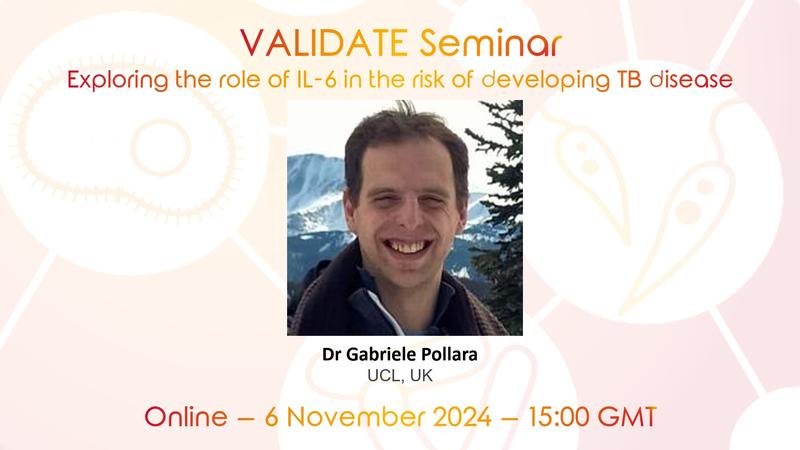
In this seminar, Dr. Gabriele Pollara delved into the study of IL-6 responses and their impact on human tuberculosis (TB) disease risk. Recognizing the limited understanding of how universal IL-6 responses influence TB disease, Gabriel and his team undertook a comprehensive investigation focusing on single nucleotide polymorphisms (SNPs) in and near the IL-6 receptor (IL6R) gene. Utilizing a diverse array of genetic and epidemiological methodologies, their study aimed to determine whether altered IL-6 signaling was causally associated with the risk of developing TB disease. The team uncovered compelling evidence supporting their hypothesis through Mendelian randomization analyses of genome-wide association studies (GWAS) data, encompassing thousands of cases and controls across multiple ancestries.
VALIDATE Members can watch the recording on the VALIDATE Hub.

About the Speaker
Prof Gabriele Pollara is an Associate Professor in Infection at UCL, UK. His research primarily focuses on delineating the processes underlying pathological immune responses in TB disease and leprosy, as well as their associated paradoxical reactions. Using systems-level bioinformatic deconvolution of bulk- and single-cell transcriptional responses from the sites of challenge models and disease, alongside spatial transcriptomic assessments, population-level genetic epidemiology, and tractable in vitro models, his group aims to gain insights into the immunopathogenesis of these diseases.
Gabriele's overarching ambitions are to define rational therapeutic targets to attenuate tissue pathology and to explore the use of adjunctive immunomodulatory host-directed therapies in experimental medicine studies that ultimately facilitate the transition to early-phase clinical studies.
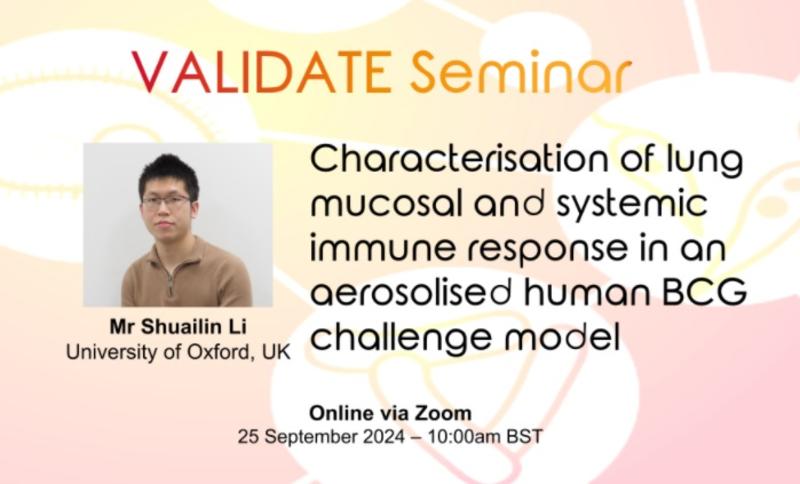
Mr Shuailin Li will discuss a study that investigated the immune response induced by aerosol-inhaled, live-attenuated Mycobacterium bovis BCG in a controlled human infection model. This study used various immunological profiling techniques, including flow cytometry, single-cell RNA sequencing (scRNA-seq), and T cell receptor sequencing (TCR-seq), to examine alterations in cellular composition, gene expression, and T cell responses across lung mucosa and peripheral blood compartments. The findings provide insights into the local and systemic immune dynamics, offering a comprehensive characterization of the immunological shifts and T cell repertoires elicited by aerosolized BCG exposure.
Cutaneous leishmaniasis caused by Leishmania parasites exhibits a wide range of clinical manifestations. Although parasites influence disease severity, cytolytic CD8 T cell responses mediate disease. While these responses originate in the lymph node, we find that expression of the cytolytic effector molecule granzyme B is restricted to lesional CD8 T cells in Leishmania-infected mice, suggesting that local cues within inflamed skin induce cytolytic function. We recently found that Leishmania-infected lesions are hypoxic, and that the recruitment of neutrophils causes hypoxia. Notably, the hypoxic state of the infected skin results in the expression of granzyme B in CD8 T cells, resulting in more severe disease. Thus, targeting hypoxia-driven signals that support local differentiation of cytolytic CD8 T cells may improve the prognosis for patients with cutaneous leishmaniasis, as well as other inflammatory skin diseases where cytolytic CD8 T cells contribute to pathogenesis.
Register using the online form below.
About the Speaker
Dr Fernanda Novais was born in Brazil, a country where cutaneous leishmaniasis is endemic, and she has studied immunity to cutaneous leishmaniasis in mice and humans for over 20 years. Dr. Novais’ discoveries have led to (i) an understanding of how neutrophil-macrophage crosstalk promotes Leishmania killing, (ii) the identification of monocyte subsets responsible for parasite control, and (iii) a new paradigm in which CD8 T cells are pathogenic rather than protective in cutaneous leishmaniasis. Her lab is currently focused on understanding how the environmental signals from the Leishmania-inflamed skin dictate the function of immune cells.
Recently, there have been strong indications that it is possible to increase the immune response by a second dose of BCG vaccine. Thus, the BCG vaccine re-emerged to be considered based on a significant protective effect of BCG revaccination against TB and supporting its beneficial non-specific, agnostic, or heterologous effects. The latter has also been reported to reduce neonatal sepsis, respiratory tract infections, and all-cause infant mortality. In fact, the past pandemic has stimulated us and other investigators to scrutinize the effect of the BCG vaccine as a strategy to reduce severe COVID-19. Using both wild-type and variant virus sequences, we have gone through several preliminary in silico screenings, such as epitope toxicity, immunogenicity, antigenicity, MHC-I profiles, and positive response employing IFN-g production. Various BCG-vaccination schedules have been reevaluated in recent research clinical trials due to high numbers of TB cases and deaths, but the community still waiting for a convincing response about novel BCG-formulations and BCG-vaccination protocols.
Register using the online form below.
About the Speakers

Prof Paulo Antas is a Professor of Biology and a Senior Researcher. He completed both MSc and PhD at FIOCRUZ, Brazil, He is also working as Editorial Board member and Reviewer for scientific journals. He wrote Book chapters and e-books. In addition, he has been working on innate immune responses against Tuberculosis (TB) in individuals naturally exposed to Mycobacterium tuberculosis at FIOCRUZ since 2007. Since those years, he has been working in a group that develops research on the field of clinical immune response of vaccinations against human TB, especially in the cellular immunology area. Most of his scientific time is currently dedicated to studying several aspects of in vitro immune response before and after BCG vaccination, such as the involvement of inflammatory cytokines, and T cells on immune response against mycobacteria. As a result, he has accumulated significant data and thus experience in this field. In addition, he spent time working on projects related to biomarker detection in patients with extrapulmonary TB, particularly the pleuritic form, comparing them to those responses among persons with either pulmonary form or other pleural diseases. This work in Pleural TB has provided him with yet another laboratory skill set that has been complementing the skills he has gained in TB immunology thus far.

In 2016, Prof Thales A Campelo graduated in Pharmacy from the Federal University of Ceará (UFC). Additionally, he obtained a specialization in Clinical Microbiology in 2021 and a Master of Science degree in Pathology in 2018, both from Unichristus College in Ceará state (CE). Prof. Campelo's expertise is centered in the field of Microbiology, with a primary focus on Mycobacterium tuberculosis, M. leprae, HPV, and molecular diagnosis of other infectious diseases, utilizing Multiplexed PCR, Nested PCR, and Real-Time PCR approaches. During the recent COVID-19 pandemic, he worked as a Clinical Analyst Pharmacist, conducting extensive qPCR tests for COVID-19 at FIOTEC/FIOCRUZ in CE. Furthermore, in 2023, Prof. Campelo had the opportunity to supervise Clinical Microbiology, Microbiological Control, and Clinical Analysis Internships in the Pharmacy program at the University of Fortaleza (UNIFOR). Currently, he is pursuing a Ph.D. in Pathology at UFC, conducting fundamental research on Sars-CoV-2 peptides intended for use in understanding the human immune response to Sars-CoV-2. In this research project, Prof. Campelo has acquired expertise in bioinformatics during the development of epitope predictions targeted towards both TCD8 and TCD4 immune responses.
Burkholderia pseudomallei, the etiologic agent of melioidosis, causes severe diseases in both humans and animals. Due to its potential misuse as a biological warfare agent, high mortality rates, and resistance to antibiotics, significant efforts have been made in the past decade to develop vaccines against melioidosis. B. pseudomallei produces several polysaccharides on its surface that are important virulence factors and major targets of the immune response. Leveraging their expertise in synthetic carbohydrate chemistry, Charles Gauthier and Maude Cloutier’s group has been at the forefront of developing mimics of the main polysaccharides produced by B. pseudomallei, namely lipopolysaccharide O-antigen (LPS OAg), capsular polysaccharide, and exopolysaccharide.
In this seminar, Charles and Maude describe their endeavor toward the development of semi-synthetic glycoconjugate vaccines against melioidosis, focusing on our most promising results involving B. pseudomallei LPS OAg mimics.
About the Speakers

Dr Charles Gauthier completed his PhD in natural products chemistry at the Université du Québec à Chicoutimi (2008), followed by postdoctoral fellowships in carbohydrate chemistry at the Institut Pasteur in Paris (2010) and in chemobiology at the University of Oxford in United Kingdom (2011). After a stint as Maître de Conférences at the Université de Poitiers in France (2011-2016), Dr. Gauthier joined the Centre Armand-Frappier Santé Biotechnologie of the Institut national de la recherche scientifique (INRS) as Assistant Professor in 2016. He was promoted to the rank of Associate Professor in 2020 and Full Professor in 2023. His research program mainly focuses on the synthesis of microbial glycans for the development of prophylactic and therapeutic approaches. Dr. Gauthier has published over 55 peer-reviewed papers and book chapters since the start of his career and has supervised/co-supervised the work of over 55 students, trainees, and postdocs. Dr. Gauthier’s research program is funded by several national and international granting agencies, including NSERC, CIHR, NIH, and the Pasteur Network. He has received FRQS salary support as a Junior 2 and Senior Scholar. Dr. Gauthier is an active member of several national and international learned societies, including Oxford University’s VALIDATE network, GlycoNet, CRIPA, RISUQ, CISD, and CERMO-FC.
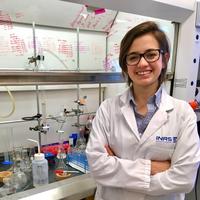
Dr Maude Cloutier obtained her BSc in chemistry from the Université du Québec à Trois-Rivières (UQTR) in 2018 working under the guidance of Pr. Gervais Bérubé in the aim of developing new therapeutic compounds against pathological inflammation. Maude was awarded MSc scholarships from the Fonds de Recherche du Québec – Nature et Technologies (FRQNT) and the Natural Sciences and Engineering Research Council of Canada (NSERC) allowing her to pursue her studies in Pr. Gauthier’s group at Institut national de la recherche scientifiques (INRS) in Laval, Canada. In 2023, she completed her PhD as a Vanier Scholar in Pr. Gauthier’s group and is currently working as a postdoctoral fellow. Maude's work focuses on the total synthesis of bacterial mono- and oligosaccharide mimics as potential therapeutics and prophylactics.
The recent COVID-19 pandemic made it clear that a lot could be gained from decentralised vaccine development. Also, many diseases are localized to Low and Middle Income Countries, especially in tropical regions. However, research in immunobiologicals is costly and requires infrastructure and collaborations that are scarce in poorer countries. In this seminar Breno Beirão explores two important question, how should we tackle this, and if so, how and should we leave it in favour of investing in more basic needs of these poor communities?
Register using the online form below.
About the Speaker

Adjunct Professor Breno Castello Branco Beirão earned his Veterinary Medicine degree from the Federal University of Paraná in 2009, followed by a master's degree in Microbiology, Parasitology, and Pathology from the same university in 2011. He successfully completed his Ph.D. at the Roslin Institute/University of Edinburgh. Breno specializes in various fields, including the immune system, flow cytometry, molecular biology, basic and applied immunology, and the development of therapeutic monoclonal antibodies.
Currently, his research focuses on producing vaccines for zoonotic diseases such as ovine Orf virus, Sporothrix brasiliensis, and addressing the ongoing challenges posed by COVID-19.
In 2022, VALIDATE initiated the project: “Develop novel test for PKDL/Leprosy diagnosis”. This project, led by Prof Chatterjee, aims to address the challenge of post-kala-azar dermal leishmaniasis (PKDL) in South-East Asia. PKDL cases can harbor parasites, perpetuating the transmission cycle of the disease. The team plans to develop a field-applicable diagnostic tool, building on a validated isothermal amplification-based assay. Additionally, considering the clinical overlap between PKDL and leprosy, the project includes the development of a combined diagnostic test for both diseases. The ultimate goal is to provide a cost-effective, point-of-care diagnostic tool that can aid in monitoring and treating these neglected tropical diseases, contributing to the Kala Azar Elimination Programme and WHO Global Leprosy Strategy.
In this seminar, Mitali and Ahmed will discuss the PKDL and Leprosy field assays developed by the project and dig into the underlying science.
Register using the online form below.
About the Speakers

Prof Mitali Chatterjee is a Professor of Pharmacology at IPGMER, Kolkata, India. Mitali specializes in immunopharmacology with a focus on Leishmaniasis. Her research group has developed DNA-based assays for PKDL diagnosis and plays a central role in West Bengal's Leishmaniasis surveillance, contributing vital information on parasite load for measuring treatment effectiveness.

Dr Ahmed Abd El Wahed, received his PhD in biology from Goettingen University, Germany in 2011. He established a mobile suitcase laboratory for the rapid detection of viruses, bacteria, and parasites. His model has been deployed in several African and Asian countries. He also has a focus on epitope mapping after immunisation and vaccination to identify the best candidate for vaccines using microarrays.
VALIDATE 2023 Seminars - Watch Now
Seminar Three took place on Tuesday, December 13, 2023, at 10:00 GMT.
- The Role of Vaccination in Controlling Animal TB with Prof. Eamonn Gormley, UCD, Ireland
In the context of One Health epidemiology for M. bovis infection, managing wild animals' involvement can be challenging, often involving segregation, test-and-cull, or enhanced biosecurity. Vaccination, such as the BCG vaccine, shows promise in reducing tuberculosis burden in wildlife, as seen in badger vaccination in Ireland and the UK. In this talk, Eamonn discusses the challenges of managing wild animals' involvement in the One Health epidemiology of M. bovis infection, highlighting vaccination as a promising strategy, as exemplified by badger vaccination in Ireland and the UK. - Tip of the Iceberg: TB in South African Wildlife with Prof. Michele Miller, Stellenbosch University, South Africa
Michele provided an overview of TB in wildlife in the South African context. Using a One Health approach, this talk will cover some of the underlying issues contributing to TB presence and spread within wildlife and at human-livestock-wildlife-environmental interfaces.
Seminar Two took place on Zoom, 23 November 2023 at 14:00 GMT.
There were two fascinating talks:
-
Solutions against infectious diseases in indigenous population: inter-cultural challenges in One Health with Dr Juan Dib, Universidad del Norte, Colombia
Juan investigates the intercultural challenges in implementing One Health solutions against infectious diseases in indigenous populations. He highlights the fundamental differences in the worldview of health and disease between indigenous societies, which view health holistically, and Western medicine's reductionist approach. Juan also examines the need for improved research efforts and surveillance programmes that are tailored to remote indigenous communities to better identify disease burdens and promote public health action. -
Impact and solutions to inequitable health care infrastructure on TB in Madagascar with Dr Niaina Rakotosamimanana, Pasteur Institute of Madagascar. In this talk, Niaina addresses strategies to improve TB care and obtain epidemiological information in remote areas of Madagascar, including the use of new technologies, instructional videos, medication reminders, remote monitoring, and even drones for samples and treatment transportation, all of which aim to enhance patient education, adherence, and symptom monitoring.
About the Speakers

Dr Juan Dib is a Research Professor at the Universidad del Norte, Colombia.
For more than 20 years Juan has been dedicated to the integral study of tropical diseases, parasitology and infectious diseases in rural and remote areas of Colombia with indigenous populations. He has experience teaching PhD students, developing fieldwork with communities and doing surveillance of infectious diseases. Juan also has expertise in determining transmission dynamics of infectious diseases by molecular epidemiological studies and POCT in rural remote areas.

Dr Niaina Rakotosamimanana is the Head of the Mycobacteriology Unit at the Pasteur Institute of Madagascar.
Niaina has been working on TB at the Institut Pasteur de Madagascar since 2010. He is currently leading a TB research program which includes translational and operational research programs that aimed to develop new TB diagnostic tools and perform drug resistance surveillance in collaboration with the National Tuberculosis Control Program of Madagascar.
In September 2023, members of the VALIDATE network and subject matter experts from around the world convened in Paarl, South Africa, to explore the application of the One Health model in the development of vaccines for Tuberculosis (TB) and Leishmaniasis. The One Health model was an interdisciplinary approach that acknowledged the interrelationships between human health, animal health, and environmental health.
During the workshop, valuable presentations were delivered by VALIDATE members, and we were pleased to share these insights with the broader VALIDATE Community with a series of Online Seminars.
Seminar One took place on Zoom, 15 November 2023, 15:00 GMT.
- How to Win at Hide and Seek: Utilizing Omic Approaches to Identify and Target Neglected Pathogens by Dr. Richard Burchmore, University of Glasgow.
In the talk, Richard will outline the opportunities and limitations of Omic approaches and give some examples of how they can be applied in the diagnosis and control of NTDs.
- Unforeseen Ramifications of Antimicrobial Usage: A Case Study on Antimony by Dr. Maria Adelaida Gomez, CIDIEM.
In this talk, Adelaida will reflect on the unexpected impacts of antileishmanial use in the context of water pollution and cultural practices in endemic populations. This will lead the way to discussing challenges and opportunities for control of leishmaniasis, under the umbrella of human, animal and environmental health.
About the Speakers

Dr Richard Burchmore is the Head of Proteomics & Senior Lecturer in Parasitology, University of Glasgow, UK.
Richard has been a leishmaniac since his undergraduate research project back in 1988. His research primarily centers around host: pathogen interactions, with a special emphasis on the role of parasite nutrient transporters. A significant portion of Richard’s work involves leveraging mass spectrometry for proteomic and metabolomic analyses.

Dr Maria Adelaida Gomez is a Scientist and Coordinator at CIDEIM in Colombia.
Adelaida focuses on investigating host-pathogen interactions and mechanisms impacting the clinical and therapeutic outcomes of human infections with intracellular protozoan parasites. Her work on cutaneous leishmaniasis informs translational research in intracellular and neglected infectious diseases and the development of tools for therapeutic evaluation and host immunomodulation.
Took place online, 15:00 BST, 4 July 2023
Two fascinating presentations by two VALIDATE members from St George's, University of London focused on the development of a potential Spore-FP1 vaccine for tuberculosis (TB). Prof Rajko Reljic examined the Spore-FP1 mucosal vaccine candidate based on the fusion protein of Ag85B-Acr-HBHA/heparin-binding domain adsorbed on the surface of inactivated Bacillus subtilis spores. The vaccine candidate demonstrated significant protection in mice and guinea pigs when used as a mucosal boost to BCG but did not improve the efficacy of BCG alone in NHP. Mr Emil Vergara then explored the potential of two subunit vaccine candidates, Spore-FP1 and Nano-FP1, as post-exposure TB vaccines in mice with pre-existing lung mycobacterial immunity elicited with Mycobacterium bovis BCG. Results showed an increasing trend in the frequency of tissue-resident memory T cells, antigen-specific effector CD4 and CD8 T cells, and mucosal and systemic antibody responses among mice that received candidate vaccines.
Took place Online, 13:00 BST, 29 June 2023
In this talk, Dr Yumiko Tsikamoto discussed her innovative research which has led to the development of a recombinant BCG vaccine against Mycobacterium tuberculosis. This novel vaccine features MTB-derived MMP-II and has been further modified by depleting the UreC gene, which stimulates phagosome-lysosome fusion in host cells infected with the recombinant BCG. Yimko will discus results from in vivo experiments that used a mouse model and show that this vaccine inhibits the multiplication of M. tuberculosis in the lungs much more efficiently than the traditional host BCG. Remarkably, the research team also achieved the development of an antibiotics-free recombinant BCG, utilizing cutting-edge auxotrophy-based recombination techniques. These groundbreaking findings represent a major advancement in the ongoing global effort to combat tuberculosis.
In this seminar, Dr Apichai Tuanyok discussed his team’s multidisciplinary research to investigate the epidemiology of melioidosis in southern Thailand.
The seminar took place via Zoom on 22 February 2023 at 15:00 GMT.
Video coming soon - www.validate-network.org/event/one-health-thailand
For our first VALIDATE Event of 2023, we hosted an exciting double bill: Two talks, covering two pathogens, from two VALIDATE members at the Institut Pasteur de Tunis, Tunisia.
You can watch the two talks below:
Targeting FOXO3 transcription factor as a Host-Directed approach to enhance the efficacy of BCG against Mycobacterium tuberculosis
with Prof Makram Essafi
Professor Makram Essafi will speak about his work on targeting the FOXO3 transcription factor as a host-directed approach to enhance the efficacy of BCG against Mycobacterium tuberculosis.
Vaccine against Human Leishmaniasis: Institut Pasteur de Tunis Contribution
with Prof Dhafer Laouini
In this seminar, Dr Apichai Tuanyok discusses his team’s “One Health” approach and multidisciplinary research to investigate the epidemiology of melioidosis in southern Thailand.
VALIDATE Winter Seminars 2022
Seminar took Place 14 December - 15:00 GMT
In this seminar, Dr Luciana Balboa will discuss how her team focused on unravelling the immunometabolic pathways that regulates leucocytes’ functions and their impact on the control of TB. To study the impact of TB-associated microenvironment on the functionality of M1 macrophages, they used the acellular fraction of pleural effusions from TB patients (TB-PE). Interestingly, they found that M1 macrophages exposed to TB-PE displayed a lower expression of HIF-1α and a reduced glycolytic activity, impairing the control of the bacterial growth.
Seminar took place 16 November 2022 - 15:00 GMT
Antigen-delivery vaccine platforms that promote humoral and cellular responses while maintaining a safe profile are a roadblock to developing subunit vaccines against Burkholderia pseudomallei. The Torres Lab at UTMB has used gold nanoparticles for the delivery of multicomponent antigens, identified by the bio-immunoinformatic analysis, that is able to induce vaccine-mediated immunity, promoting protection against melioidosis disease.
In this talk, Prof Alfredo G Torres discussed his team's latest research on nanovaccines.
VALIDATE ECR Summer Showcase Seminars
Session 1
This session took place at 10:00am BST on 22 June 2022
Watch the video: To watch the video, members can contact VALIDATE to request access.
Chair: Dr Naomi Daniels

Speakers and Topics

Epidemiological characteristics of melioidosis in Southern Vietnam via the number of culture-confirmed cases at the largest referral general hospital Dr Nguyen Ho Lam |

Adjuvants for vaccine: receptor ligand-based molecular interaction to discover adjuvants for human toll-like receptors Dr Nidhi Gupta |

Development and application of the mycobacterial growth inhibition assay (MGIA)
Dr Rachel Tanner |
Speakers and Topics
This session took place at 16:00 BST on 13 July 2022
Watch the video: To watch the video, members can contact VALIDATE to request access.

The underappreciated role of neonatal BCG vaccination in educating gut microbiota Assistant Professor Nargis Khan |

Using non-human primates for TB Vaccine evaluation Dr Laura Sibley |

Generating vaccines against tuberculosis based on our knowledge of mycobacterium biofilms Dr Cristian Segura-Cerda (CHAIR) |
"A Vaccine for...?" Seminar Series - Watch now on YouTube
This seminar took place on 28 June 2022 at 16:00 pm BST
This is the third in our "A Vaccine for" seminar series, in which leading experts will provide an overview of the state of vaccine research for VAIDATE’s focus pathogens. In "A Vaccine for Leprosy?", Dr Khushboo Borah and Dr Chyntia Carolina Díaz Acosta discuss the prospects for a vaccine for Leprosy, the disease caused by Mycobacteria Leprae of which there are still over 200,000 new cases of diagnosed every year.
This seminar took place on 18 May 2022 at 13:00 BST
In this seminar, Prof Mukhopadhyay and Dr Dastidar discuss the prospects for a vaccine for Melioidosis, the disease caused by a bacterium, Burkholderia pseudomallei, which is found across tropical and semi-tropical regions worldwide.
This seminar too place on 6 April 2022 at 10:00am BST
In “A Vaccine for Leishmaniasis?”, Prof Mitali Chatterjee and Dr Mohamed Osman provided an overview and update on the current state of research into vaccines for a disease that causes up to 40,000 deaths annually.
The seminar is especially interesting to vaccine researchers who do not study leishmaniasis.
The event took place at 10:00 am BST, on 6 April 2022.
Special Seminar
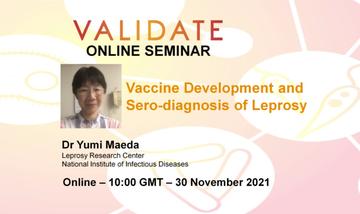
The seminar took place at 10:00 GMT, 30 November 2021
Speaker: Dr Yumi Maeda, Leprosy Research Center National Tokyo Institute of Infectious Diseases, Japan
Watch the video: To watch the video, members can contact VALIDATE to request access.
BCG is the most studied vaccine and holds promise. Several studies indicate that BCG confers some protection against leprosy. In this talk, Dr Yumi Maeda, of the Leprosy Research Center National Tokyo Institute of Infectious Diseases, Japan, discusses how her team constructed a recombinant BCG that secretes Major Membrane Protein-II of M. leprae, and found that it was effective in inhibiting the growth of M. leprae in mice footpads. Studies are underway to produce BCG that is stable and can be used for large scale preparation.
Detection of leprosy is also necessary for early treatment. From the analysis of the genomic sequence, specific genes coding for antigens of leprosy were selected for evaluating the antibodies in the sera of patients, and user-friendly tools are also being developed.
VALIDATE Industry Seminars 2021 - Watch Now
This seminar took place on 15 July 2021
Dr Xiao discussed the Immunology of latent TB infection (LTBI) and active TB disease, the granuloma formation and T cell medicated immunity and the immunology behind T cell-mediated immunity tests.
Speaker:
Dr Yupei Xiao has PhD in Respiratory Medicine with over 10 years of clinical research experience in haematology-oncology and respiratory medicine. Dr Xiao currently works in medical affairs for IVD company, and she is an experienced speaker and expert in clinical and scientific communication.
This seminar took place on 27 April 2021
COVID has provided a stark example of pathogenic mutation. The variation of the impact of infection on the population similarly shows that human responses are variable. This highlights a key need in vaccinology of identifying and developing technologies that can address diversity whilst maintaining safety and achieving cost-effectively. In this session, Graham Clarke explores the options and particularly highlight ImmBio’s approach, exemplified by its lead development against Streptococcus pneumoniae, a good example of a bacteria in circulation with a wide array of genotypes. Whilst there are products available providing good protection against specific serotypes, as defined by the polysaccharide capsule used in the current class of vaccines, ImmBio’s focus is a multiple-protein approach. A new approach raises new regulatory and manufacturing challenges but again drawing on COVID experience, vaccinology may be able to able to benefit from a paradigm shift in addressing risk and benefit, enhancing the attractiveness of investing in new vaccines.
Speaker: Graham Clarke is ImmBio’s Chair and previously its CEO. Originally a biophysicist, he has held senior-level positions including at SmithKline Beecham, GSK and GE Healthcare. He is now a non-executive on a number of boards, including the UK’s Medicine Discovery Catapult and NHS Health Research Authority. He has also been a member of the UK government’s COVID therapeutic task force.
This seminar took place on 11 March 2021
In an upcoming publication in Nature Biotechnology, Dr Sheila Keating and her team have demonstrated the technology to capture entire immune repertoires from infected or vaccinated individuals, to be used to treat difficult to treat infections - and have demonstrated this work with COVID and respiratory bacterial infections. In this talk, Dr Sheila Keating described the technology and will mapped out potential pathways for developing passive immune therapeutics that will not only treat but also help to prime immune responses to protect against future infections. Location: Online via Microsoft Teams
Speaker:
Dr Sheila Keating is a VALIDATE Network Investigator Adjunct Associate Professor at GigaGen and the University California San Francisco. Over the past 15 years, Sheila's work has focused on understanding cellular and humoral immune responses to vaccines and infectious diseases and, more recently, has focused on using high throughput immune assays to measure biomarkers of immune response or pathology in a number of studies ranging from HIV, HCV, HBV vaccine breakthrough, Chagas, West Nile Virus, cardiovascular disease, neuropathology and many other areas.
VALIDATE Winter Seminars 2020 - Watch on YouTube Now!
This seminar took place on 15 December 2020.
Speaker:
Dr Maria Adelaida Gomez is VALIDATE Network Investigator and a Coordinator at the Molecular Biology and Biochemistry Lab at CIDEIM in Cali, Colombia. Adelaida is currently working to unravel the host-pathogen interactions and underlying mechanisms that determine the outcome of human Leishmania infections and therapeutic responses, towards the identification of host and parasite biomarkers of treatment outcome, and intervenable host functions to optimize therapeutic strategies.
This seminar took place Online on 3 December 2020
Speakers:
Giorgio Colombo is Professor of Organic Chemistry at the Dept of Chemistry, University of Pavia. Prof Colombo has authored or coauthored more than 150 scientific publications in international journals, and works to integrate molecular dynamics, computational physical-chemistry and bioinformatics approaches to study the dynamics and specificity of protein-ligand recognition and binding.
Louise Gourlay is an Assistant Professor in Biochemistry at the Department of Biosciences at the University of Milan, Italy. Asst Prof Gourlay is a structural biologist and biochemist with a principal interest in using 3D structure information, obtained via X-ray crystallography, to re-engineer protein antigens/epitopes from Burkholderia pseudomallei, to improve their potential use as immunogens in a melioidosis vaccine and on developing novel, immunodiagnostic tests for emerging infections.
This seminar took place on 24 November 2020
Speakers:
Professor Samantha Sampson is a TB researcher and heads the Host-Pathogen Mycobactomics Research Group at Stellenbosch University. The group aims to gain a better understanding of how the pathogen Mycobacterium tuberculosis interacts with its host to cause disease.
Dr Jomien Mouton is a post-doc in Prof Sampson's Host-Pathogen Mycobactomics Research Group at Stellenbosch University and is a VALIDATE Fellow. Dr Mouton's work focuses on establishing and validating a new dual-reporter system that can be utilised to identify and isolate “persister” populations of Mycobacterium tuberculosis.
VALIDATE Summer Seminars 2020 - Watch now!
To watch the video, VALIDATE members can contact VALIDATE to request access.
This seminar took place on 1 September 2020
Speakers:
Bernardo Villarreal-Ramos is VALIDATE Network Investigator and Professor of Immunology at the University of Aberystwyth and the Animal and Plant Health Agency (APHA), UK with a research focus on Tuberculosis, animal models, vaccines and T-cells.
Amanda Gibson is a VALIDATE Network Associate and Lecturer in Innate Immunology at Aberystwyth University whose research interests lie in underpinning early events required for establishing infection; the interaction between mycobacteria and host cells, particularly with the innate immune system at the point of recognition and uptake and initial responses leading to disease.
To watch the video, VALIDATE members can contact VALIDATE to request access.
This seminar took place on 29 July 2020
Speakers:
Associate Professor Hiro Goto is a VALIDATE Network Investigator based at the Universidade de Sao Paulo (USP), Brazil. Hiro's research focus is on immunopathology and the diagnosis of leishmaniasis.
Eduardo Milton Ramos Sanchez is a VALIDATE Network Associate and Post-doctoral researcher presently working at the Institute of Tropical Medicine of Sao Paulo, USP, Brazil. Eduardo has been involved in the purification and production of recombinant antigens for the development of serological tests for leishmaniasis and Malaria and vaccines for Bovine mastitis.
To watch the video, VALIDATE members can contact VALIDATE to request access.
This seminar took place online on 23 July 2020
Speaker: Mary Burtnick is a Network Investigator and Associate Professor based in the University of Nevada, Reno School of Medicine. Mary has nearly two decades of experience working with pathogenic Burkholderia species and her current research focuses on the identification of antigens expressed by Burkholderia pseudomallei that can be used to develop novel vaccines, diagnostics and immune assays to combat melioidosis.
To watch the video, members can contact VALIDATE to request access.
This seminar took place online on 30 June 2020
Speakers:
Prof Siobhán McClean is an Associate Professor at School of Biomolecular and Biomedical Science, UCD. Prof McClean has a research interest in host pathogens associated with respiratory pathogens that cause opportunistic infections and in identifying vaccine antigens that are protective against Burkholderia pseudomallei.
Dr Julen Tomás Cortázar is a postdoctoral researcher at UCD. He is leading part of a project funded by Wellcome Trust agency to develop a vaccine against Melioidosis caused by the Gram-negative bacteria Burkholderia pseudomallei.
Watch the Seminar: Members can watch first logging on to WebLearn and then clicking here.
Seminar Archive
To watch the video, members can contact VALIDATE to request access.
This seminar took place on 15 January 2020
VALIDATE Network Management Board member Prof Andrea Cooper delivered this seminar on 15 Jan 2020 at the Jenner Institute, and has kindly agreed for us to share it with all VALIDATE members.
To watch the video, members can contact VALIDATE to request access.
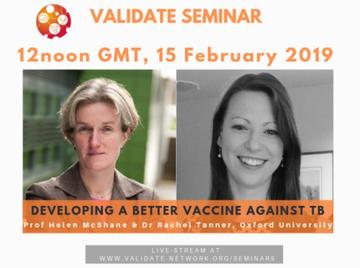
This seminar took place 15 February 2019 and was led by Prof Helen McShane and Dr Rachel Tanner.
TB kills more people than any other infectious disease. The efficacy of the only available vaccine, BCG, is highly variable and lowest in high burden settings. The McShane group is developing novel TB vaccine candidates by identifying novel antigenic targets and exploring novel routes of immunization.
TB vaccine development is challenging given the lack of defined immunological correlates of protection. Class II restricted T cells are critical for protective immunity but may not be sufficient. Dr Tanner provided an update on functional mycobacterial growth inhibition assays and on a role for antibodies in protective immunity.
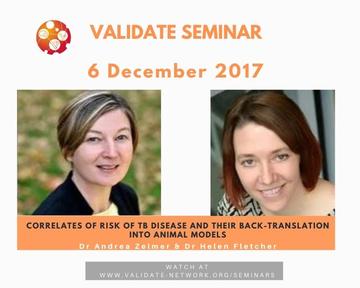
This seminar took place on the 6 December 2017 at LSHTM and was led by Dr Andrea Zelmer and Dr Helen Fletcher, LSHTM.
Immune correlates of risk of TB disease have recently been identified in human clinical trials. These correlates indicate that, years before TB disease develops, there is alteration in the host-immune environment which is associated with risk of TB disease. Perhaps these alterations render the immune environment permissive to mycobacterial infection or increased growth, or perhaps they reduce the efficacy of the BCG vaccine? Back translation of immune correlates of risk into animal models will enable us to address these questions and model the immune response of those individuals at greatest risk of TB disease.
Members can watch the seminar on LSHTM's Panopto Account


